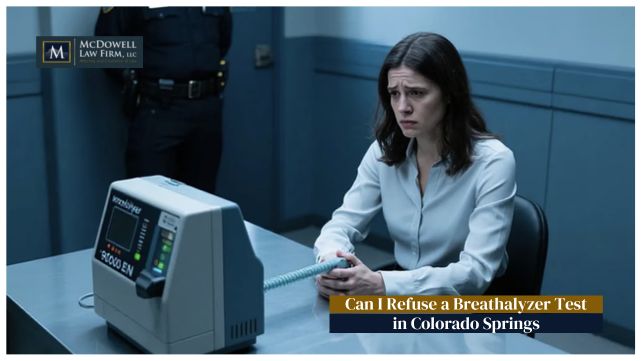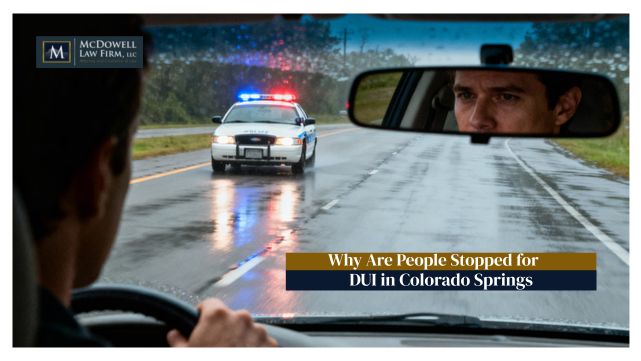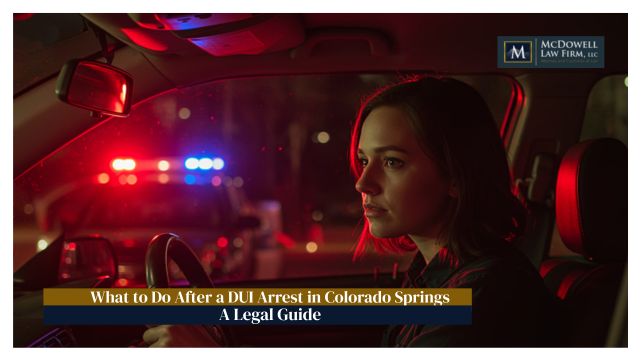You got pulled over in Colorado Springs. The officer suspects DUI and asks you to take a breathalyzer test. Your mind races: Can I refuse? Should I refuse? What happens if I say no?
The answer is yes, you can refuse a breathalyzer test in Colorado. But refusal comes with serious consequences that could be worse than taking the test and failing it.
Here’s what you need to know about refusing chemical tests in Colorado and how it affects your case and your license.
Understanding Colorado’s Express Consent Law
Colorado is an express consent state. By driving on Colorado roads, you have already consented to chemical testing if an officer has probable cause to believe you’re under the influence. This means:
- You agreed to testing when you got your license
- Refusal triggers automatic penalties
- Police can still obtain a warrant for your blood
The express consent law applies to evidentiary chemical tests, not to roadside preliminary breath tests. (PBTs)
Two Types of Breath Tests: Know the Difference
1. Preliminary Breath Test (PBT)
- Administered roadside during the investigation
- Small, handheld device
- Results are not admissible in court for prosecution
- You can refuse with no legal penalty
- Officer may still arrest you based on other observations
2. Evidentiary Breath Test (Intoxilyzer)
- Administered at the police station after arrest
- Large, calibrated machine (usually Intoxilyzer 9000)
- Results are admissible in court
- Refusal triggers express consent penalties
- This is the test that matters for your case and license
Many people confuse these two tests. The roadside PBT has no legal consequences for refusal. The station breath test does.
Should you refuse the PBT (handheld roadside test)? YES. If you’ve had anything to drink, taking the PBT is not a good decision.
Consequences for Refusing a Breathalyzer Test
When you refuse the evidentiary breath or blood test at the station, several things happen immediately:
1. Automatic License Revocation
- First refusal: 1-year license revocation
- Second or subsequent refusal: 2-year revocation
- No exceptions for work or family needs (before early reinstatement)
2. Evidence Against You
- Prosecution can use your refusal as evidence of guilt
- Jury instruction allows inference of consciousness of guilt
- “Why would an innocent person refuse?”
Can Police Force You to Take a Test?
Yes. If you refuse, police can obtain a search warrant for your blood. Here’s how it works:
Warrant Process
- Officer calls a judge
- Officer provides sworn testimony about probable cause
- Judge can issue warrant relatively quickly
- Medical personnel draw blood at hospital or jail
Forced Blood Draws
- Police can physically restrain you for blood draw
- Medical professionals perform the procedure
- Refusal to cooperate can result in additional charges
The warrant process means refusal doesn’t prevent testing.
License Consequences: Refusal vs. Failure
If You Refuse:
- 1-year license revocation (first offense)
- Not eligible for early reinstatement for 2 months
- Must serve minimum 2 months with no driving
- Ignition interlock required for 2 years after reinstatement
If You Take and Fail (.08 or higher):
- 9-month license revocation (first offense)
- Eligible for early reinstatement after 30 days
- Ignition interlock required for 8 months minimum
- Lower reinstatement fees
Note: Refusal results in longer license loss and extended interlock requirements.
Ignition Interlock Differences
After Refusal
- 2 years of ignition interlock required
- Cannot reduce time period
- Expensive monitoring fees for full 2 years
After Failed Test:
- 8 months ignition interlock (standard BAC)
- 2 years for high BAC (.15 or higher)
- Possible early removal with no hot or missed tests
For most people, the extended interlock period after refusal is more burdensome than the initial license suspension. It’s expensive, embarrassing, and a pain to have to continually blow into the IID.
Pros and Cons of Refusing
Potential Advantages of Refusal:
- No exact BAC number for prosecution to use
- Forces state to prove impairment through observations only
- May avoid “high BAC” enhancements if you were significantly over .08, including mandatory jail for over .20, even on a first offense.
Disadvantages of Refusal:
- Automatic 1-year license revocation vs. 9 months for failure
- 2-year interlock requirement vs. 8 months
- Refusal can be used as evidence of guilt
- Police will likely get warrant for blood anyway
- Enhanced criminal penalties if convicted
- No early reinstatement for first 2 months
The Reality: For most people, the disadvantages outweigh the advantages. The licensing penalties alone make refusal costlier than taking and failing the test. This is not a recommendation for either refusing or participating in a chemical test. It is simply informational, and an explanation of pros/cons.
Should You Refuse a Breathalyzer Test: When Refusal Might Make Sense
Refusal is rarely beneficial, but consider these scenarios:
1. Very High BAC Cases
- If you believe your BAC is significantly over .20
- High BAC cases carry enhanced penalties
2. Multiple Prior DUI Convictions
- If you’re facing felony DUI charges
- Prison time may be inevitable regardless
- Avoiding exact BAC might help at sentencing
3. Medical Conditions
- If you have conditions that affect breath testing
- GERD, diabetes, dental work can cause false readings
- Blood test via warrant might be more accurate
Common Misconceptions About Refusal
Myth: “I can’t be convicted without a breath or blood test.” Truth: Colorado convictions are possible based on officer observations, field sobriety tests, and other evidence.
Myth: “Refusal protects me from DUI charges.” Truth: Refusal can make cases harder to defend (on a case-by-case basis). If you refuse a chemical test, refuse roadside tests as well. Don’t give the prosecution more evidence.
Myth: “They can’t make me take a blood test.” Truth: Warrants allow forced blood draws in refusal cases.
Myth: “I can refuse everything with no consequences.” Truth: You can still be charged with a DUI if you refuse chemical tests and roadside tests (FSTs).
What Happens if You Refuse to Take a Breathalyzer Test?
1. Immediate Consequences
- Officer confiscates your license
- You receive a temporary driving permit (7 days) in the form of an Express Consent Notice and Affidavit.
- Must request DMV hearing within 7 days or face automatic revocation (“forfeit” after 7 days, and suspension will go active)
2. DMV Hearing Process
- Separate from criminal case
- Focus on whether you refused a lawful test
- Officer must prove you refused after proper advisement
- Very difficult to win refusal hearings
3. Criminal Case Impact
- Prosecutor will likely seek warrant for blood test
- Refusal becomes evidence against you
- Enhanced penalties if convicted
- More difficult plea negotiations
Your Rights During Chemical Testing
You Have the Right To
- Choose between breath and blood test (if offered)
- Understand the consequences of refusal
- Recant your refusal in many situations
You Cannot
- Delay testing unreasonably
- Demand a specific type of test
Officer Must Advise You
- Of express consent consequences
- That refusal will result in license revocation
- That refusal can be used as evidence against you
Getting Legal Help After Refusing a Breathalyzer Test
If you refused a chemical test in Colorado Springs, you need experienced legal representation immediately. The stakes are high:
- Your license revocation hearing is soon
- Criminal charges are pending
- Evidence rules are complex in refusal cases
An experienced DUI attorney can:
- Challenge the validity of your refusal
- Fight the validity of the stop or police contact
- Negotiate reduced charges despite refusal
- Minimize license consequences where possible
- Present alternative explanations for refusal
- Defend your charges in Court
Refused a Breathalyzer Test? Your Next Steps
Refusing a breathalyzer test in Colorado Springs creates serious consequences that often outweigh any benefits. The enhanced license penalties/criminal sanctions, and evidentiary issues make the decision an important part of your case.
If you already refused, don’t panic. Experienced legal counsel can still protect your rights and fight for the best possible outcome. The key is acting quickly to address both your criminal case and license hearing.
Contact our Colorado Springs DUI defense team today to discuss your refusal case. We understand the Colorado laws on breathalyzer test refusal and know how to build the strongest possible defense for your situation. Time is critical in refusal cases, so don’t wait to get the help you need.





